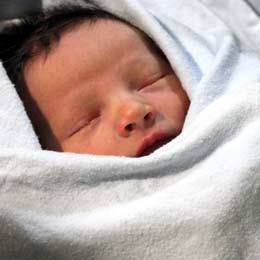Why get your child vaccinated?
Your child can get Hib disease by being around other children or adults who may have the bacteria and not know it. The germs spread from person to person. If the germs stay in the child’s nose and throat, the child probably will not get sick. But sometimes the germs spread into the lungs or the bloodstream, and then Hib can cause serious problems.
This is called invasive Hib disease.
Before the Hib vaccine Hib disease was the leading cause of bacterial meningitis among children under 5 years old in the United States. Meningitis is an infection of the lining of the brain and spinal cord. It can lead to brain damage and deafness.
Hib disease can also cause:
- pneumonia
- severe swelling in the throat, making it hard to breathe
- infections of the blood, joints, bones, and covering of the heart
- death
Before the Hib vaccine, about 20,000 children in the United States under 5 years old got Hib disease each year, and about 3% - 6% of them died.
Medications
Well-Child Checkups
Other Routine Immunizations We Provide
-
Diphtheria, Tetanus, and Pertussis (DTaP)
Diphtheria, tetanus, and pertussis are serious diseases caused by bacteria. Diphtheria and pertussis are spread from person to person. Tetanus enters the body through cuts or wounds.
-
Hepatitis A
Hepatitis A is a serious liver disease caused by the hepatitis A virus (HAV). HAV is spread from person to person through contact with the feces (stool) of people who are infected, which can easily happen if someone does not wash his or her hands properly.
-
Hepatitis B
Hepatitis B is a serious disease that affects the liver. It is caused by the hepatitis B virus. Hepatitis B can cause mild illness lasting a few weeks, or it can lead to a serious, lifelong illness.
-
Hib (Haemophilus Influenzae Type B)
Haemophilus influenzae type b (Hib) disease is a serious disease caused by bacteria. It usually affects children under 5 years old. It can also affect adults with certain medical conditions.
-
HPV
HPV vaccine prevents infection with human papillomavirus (HPV) types that are associated with many cancers.
-
Influenza - Inactivated
Influenza or “flu” is a contagious disease that spreads around the United States every year, usually between October and May.
-
Measles, Mumps, Rubella (MMR)
Measles, Mumps, Rubella, and Varicella (chickenpox) can be serious diseases. These diseases can spread from person to person through the air. Varicella can also be spread through contact with fluid from chickenpox blisters.
-
Measles, Mumps, Rubella & Varicella (MMRV)
Measles, Mumps, Rubella, and Varicella (chickenpox) can be serious diseases. These diseases can spread from person to person through the air. Varicella can also be spread through contact with fluid from chickenpox blisters.
-
Meningococcal Conjugate Vaccines (MCV)
Meningococcal disease is a serious illness caused by a type of bacteria called Neisseria meningitidis. It can lead to meningitis (infection of the lining of the brain and spinal cord) and infections of the blood.
-
Serogroup B Meningococcal (MenB)
Meningococcal disease is a serious illness caused by a type of bacteria called Neisseria meningitidis. It can lead to meningitis (infection of the lining of the brain and spinal cord) and infections of the blood.
-
Pneumococcal Conjugate (PCV13)
Pneumococcal disease is caused by bacteria that can spread from person to person through close contact. It can cause ear infections, and it can also lead to more serious infections .
-
Polio
Polio is a disease caused by a virus. It is spread mainly by person-to-person contact. It can also be spread by consuming food or drinks that are contaminated with the feces of an infected person.
-
Rotavirus
Rotavirus is a virus that causes diarrhea, mostly in babies and young children. The diarrhea can be severe, and lead to dehydration.
-
Tdap (Tetanus, Diphtheria, Pertussis)
Tetanus, diphtheria, and pertussis are very serious diseases. Tdap vaccine given to pregnant women can protect newborn babies against pertussis.
-
Varicella (Chickenpox)
Chickenpox (also called varicella) is a common childhood disease. It is usually mild, but it can be serious, especially in young infants and adults.
Immunization Schedules from the CDC
Easy-to-read formats to print, tools to download, and ways to prepare for your office visit.





















